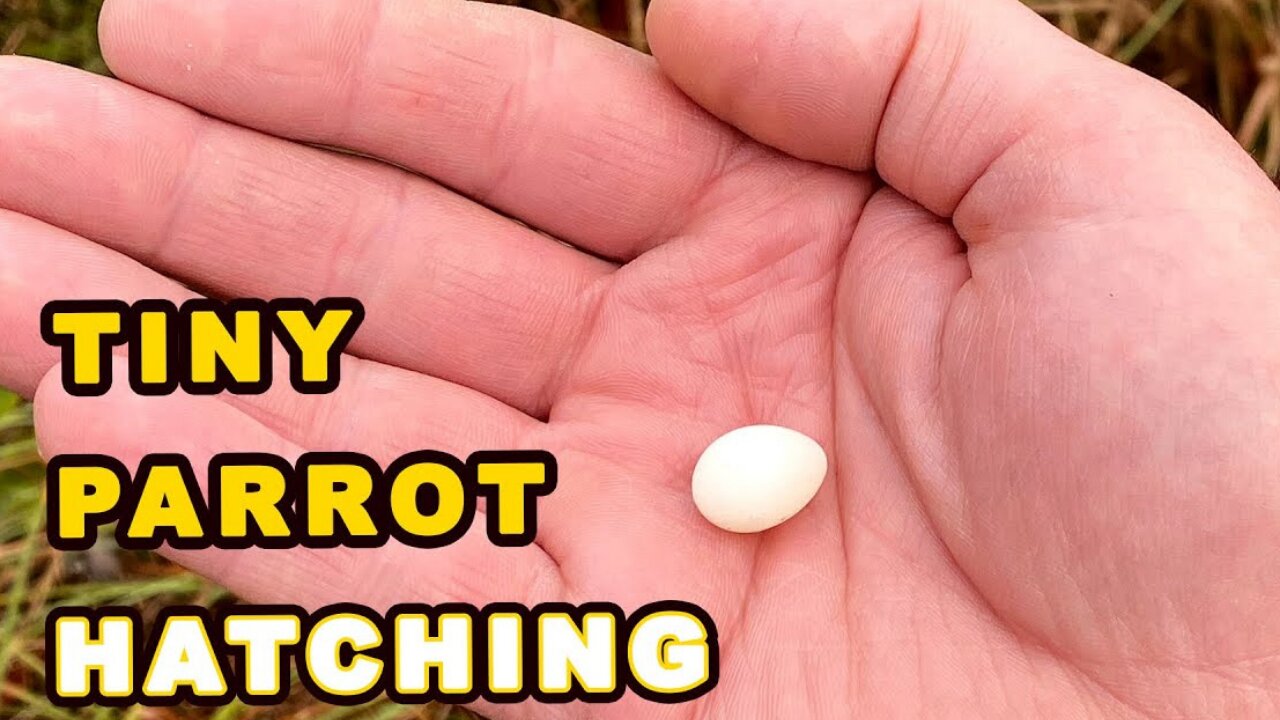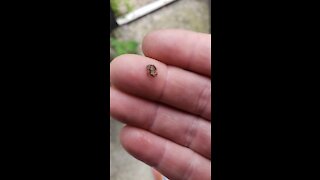Premium Only Content

The Smallest Parrot you have ever seen - Tiny egg rescue
The Smallest Parrot you have ever seen - Tiny egg rescue
Parrots have captivated many people for hundreds of years, offering beauty, affection, and intelligent companionship to people all over the world. Even those who don't profess to be bird lovers can rarely resist the charms of a well-behaved parrot. Indeed they embody so many things that people find desirable in their pets.
All to often, however, those who would love to invite a parrot into their lives refrain from adopting one because they aren't aware of the many available varieties. Not all parrots are extremely large. Read on to discover some smaller, more manageable species that can make excellent pets for the right people.
No.01 of 05
Budgies :
Long hailed as one of the most popular of all the pet bird species, the tiny Budgie (also known in many places as simply "Parakeet") is one of the smallest species of true parrots, and can make an exceptional choice for parrot enthusiasts who feel that they aren't quite ready for a very large bird. Budgies can learn to talk quite well, with some able to develop a vocabulary consisting of hundreds of words. They also love to learn tricks and have the bonus of being quieter than most other hookbills. While Budgies certainly need space to play and exercise, they can be housed in much smaller cages than larger parrots like Macaws or Cockatoos. This makes them a common choice for apartment dwellers or those with cozier quarters.
Among the shortest for "pet" birds, captive budgies average seven to 15 years' lifespan.
02
of 05
Parrotlets ;
If a Budgie isn't quite what you are looking for, then you might consider the smallest parrot species on Earth--the lovely Parrotlet. Parrotlets come in several varieties, each with unique traits. However, one thing that they all have in common is that they can make wonderful pets with proper care. Parrotlets need a lot of socialization and exercise, so it's important that those who adopt them have lots of spare time to spend with them. Some can learn to talk, but even those that don't tend to have large personalities that shine through in their antics. After all, their closest cousins are the Amazon parrots, so it's no surprise that Parrotlets delight parrot lovers with their comical dispositions.
Parrotlets in captivity enjoy lifespans of 20 to 30 years--a longterm commitment for any pet owner considering adding one to their family.
03
of 05
Lovebirds
Hailing from Africa, the beautiful colors that can be observed in Lovebird feathers are undoubtedly one of the things that make them such popular pets. They are simply stunning. Lovebirds come in a variety of types, but they can all make great pets with proper training and socialization. They don't normally learn to talk, but Lovebirds do enjoy learning tricks and can be delightful little performers in other respects. One common misconception about Lovebirds is that they must be kept in pairs--this is not the case at all. Most Lovebird owners have found that single Lovebirds tend to make better pets in general than pairs do. This is because single birds attach and bond with their owners instead of another bird.
Lovebirds' captive lifespans average 15 to 25 years, which should factor into your decision to make one part of your family.
04
of 05
Small Conures
While the majority of them are medium-sized or larger birds, some small Conure species can be great choices for those looking for a small parrot. These include the Black-Capped Conures which are only 10 inches long, and the Half-Moon Conures, which are even smaller. While they can be louder than some of the other species listed here, they are extremely intelligent, bond strongly with their owners, and love to learn tricks and play games.
Conures also have long lifespans--captive lifespan for a healthy conure averages 20 years, so this should be a consideration in your decision-making process.
05
of 05
Cockatiels
While they are slightly larger than some of the other birds on this list, Cockatiels are a very popular species of small parrot that delight bird owners both young and old with their affectionate personalities and playful dispositions. Cockatiels love spending time with their owners, and they need plenty of time each day to come out of the cage to play, exercise, and socialize. Some have been known to learn to say a few words, but by and large Cockatiels seem to prefer to mimic household sounds such as telephones and doorbells rather than human speech. They are highly trainable and respond well to positive reinforcement.
Cockatiels typically enjoy a 15- to 25-year lifespan in captivity.
-
 2:12
2:12
Floridabobcat
3 years agoRescue of worlds SMALLEST froggie!!
571 -
 LIVE
LIVE
Film Threat
21 hours agoLIVE OSCARS 2025 WATCH PARTY | 97th Academy Awards | Join the Chat!
236 watching -
 31:39
31:39
Peter Santenello
1 year agoStories From Vegas' Golden Era 🇺🇸
6.84K5 -
 LIVE
LIVE
The Why Files
6 hours agoLIVE: The Why Files 24/7 Stream n' Chat
1,609 watching -
 55:15
55:15
Russell Brand
23 hours agoThe Truth About Big Pharma & COVID with Dr. Aseem Malhotra
127K6 -
 1:19:48
1:19:48
The Rubin Report
6 hours agoWhat the Trump Administration Must Do Instead of Revenge | Peter Thiel
83.4K86 -
 1:59:00
1:59:00
Steve-O's Wild Ride! Podcast
3 days ago $33.79 earnedPatrick Bet-David DESTROYS Steve-O's Dad - Wild Ride #252
116K43 -
![[XboxONE] GRINDING 1000g FC24](https://1a-1791.com/video/fwe1/01/s8/1/y/k/I/o/ykIoy.0kob-small-XboxONE-GRINDING-1000g-FC24.jpg) 3:29:15
3:29:15
deathbee
10 hours ago[XboxONE] GRINDING 1000g FC24
77.8K4 -
 1:08:32
1:08:32
Winston Marshall
1 day agoThe HIDDEN Agenda: Congresswoman Hageman UNCOVERS USAID Fraud, Censorship and Human Trafficking
107K125 -
 8:16
8:16
CarlCrusher
23 hours agoThe True Story of Stranger Things and the Montauk Project Origins
62.8K12